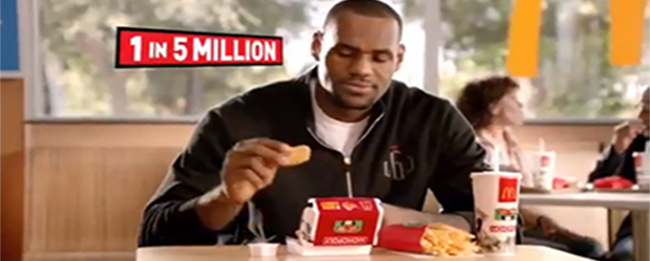When it comes to advertising, professional athletes pack a powerful punch. They represent incredible physical prowess as well as influential celebrity status, which explains why companies spend millions of dollars signing athletes to endorsement contracts. In some cases, the endorsements fit the sport—it makes sense for LeBron James to endorse sports apparel brands. But there’s cause for concern when athletes lend their highly visible celebrity status to fast food or soda.
Food marketing has been identified as a major contributor to obesity and research shows that young people are particularly vulnerable to the negative effects of food marketing. Our recent study published in Pediatrics demonstrates both that adolescents see more ads for athlete-endorsed brands than do adults and children, and that professional athletes primarily endorse food and beverage products that are energy-dense and nutrient-poor. In light of the international obesity epidemic, these are alarming discoveries.
In our study, when we looked at what kinds of brands professional athletes endorse, we found that the largest category was sporting goods and apparel (28.3%), followed closely by food and beverages (23.8%). The next closest category was consumer goods (10.9%). Athletes in the study were associated with 44 different food or beverage brands. Of the 62 food products in athlete-endorsed advertisements, 79% were energy-dense and nutrient-poor. In almost every one of the 46 beverages, 93.4%, all of the beverage’s calories came from added sugar. Peyton Manning, Serena Williams, and LeBron James had the most endorsements for energy-dense, nutrient-poor products. For television commercials featuring endorsements of food by athletes, adolescents saw the most, followed by adults and children.
More research needs to be conducted on how food consumption is influenced by athlete endorsements, but it’s clear that when athletes promote unhealthful food and sugary beverages they reach children, adults, and, most of all, adolescents. We conducted our study because of the striking irony of having physically fit athletes promote unhealthy foods. Given their prominence in popular American sports, athletes serve as young people’s role models. They have the power to encourage healthy diets and physical activity, yet they choose to promote fast food, soda, and cookies. Ideally, they would instead harness their celebrity status to promote public health. Professional athletes used to endorse tobacco products until they came to see it as a liability. We hope to also see that occur with endorsements for unhealthy food.
IMAGE SOURCE: McDonald’s commercial/ screen shot

